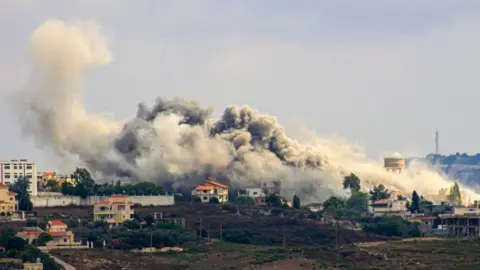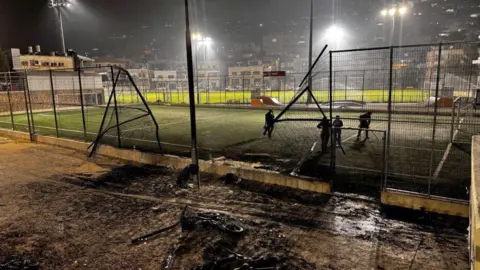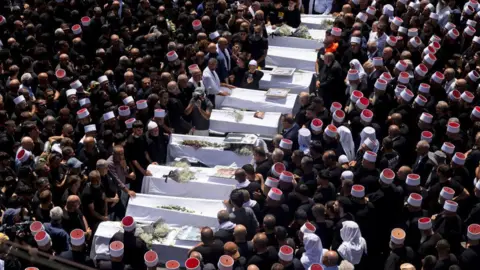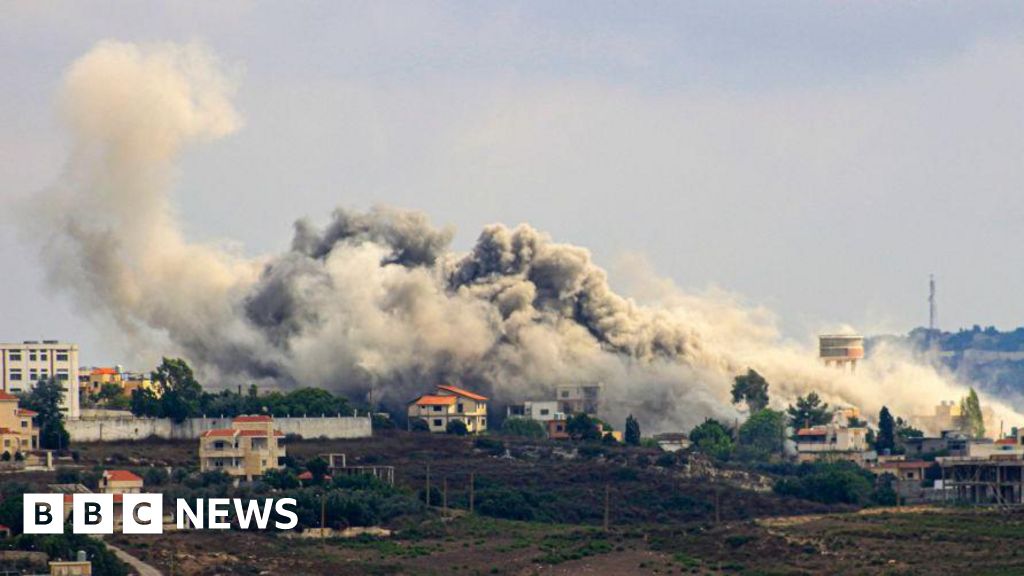 Getty Images
Getty ImagesSince October, the near-daily cross-border attacks between Israel and Hezbollah, the powerful Iranian-backed militia and political movement in Lebanon, have killed hundreds of people and forced tens of thousands from their homes on both sides, raising fears that the relatively contained violence could escalate into an all-out conflict.
Amid the strikes and counter-strikes, however, there have been indications that they were trying to avoid a major confrontation. But miscalculation was always a risk, and Saturday’s attack on the Druze town of Majdal Shams, in the Israeli-occupied Golan Heights, could have been that.
Israel accuses Hezbollah of carrying out the strike on a football pitch that killed at least 12 people, including children, the deadliest attack in the current hostilities, and has promised to respond.
“Israel will not overlook this murderous attack,” Israeli Prime Minister Benjamin Netanyahu said, according to a statement released by his office. “Hezbollah will pay a heavy price which it has not paid up to now.”
Hezbollah denies being behind the attack.
 Getty Images
Getty Images Getty Images
Getty ImagesBefore the scale of the strike became clear, however, the group said it had targeted the Hermon Brigade with an Iranian-made Falaq missile, one of several attacks carried out on that day. The base, on the slopes of Mt Hermon, is about 3km (two miles) from where the explosion happened, raising the possibility that the missile missed its target.
Daniel Hagari, a spokesman for the Israeli military, said intelligence information indicated that the attack had been carried out by Hezbollah in Lebanon, describing the group’s denial as “a lie”.
US Secretary of State Antony Blinken, too, said “every indication” was that the missile had been fired by Hezbollah, and that the US stood by “Israel’s right to defend its citizens from terrorist attacks”.
Lebanon, then, is waiting for a possible major Israeli reaction.
The strikes by Hezbollah started on 8 October, the day after the deadly Hamas attack on Israel, with the group saying they were in support for Palestinians in Gaza. So far, more than 450 people have been reported killed in Lebanon, including about 350 Hezbollah fighters and at least 100 civilians. In Israel, 23 civilians and at least 17 soldiers have been killed.
In Lebanon, most of the Israeli attacks have hit the south, where villages are destroyed and deserted, and the eastern Bekaa Valey, two areas where Hezbollah operates. An Israeli campaign targeting places that, so far, have been untouched, including parts of the capital Beirut, could lead to a dangerous and unpredictable phase in their fighting.
Seen as a significantly more formidable foe than Hamas, Hezbollah has been preparing for another major conflict with Israel since their last one, in 2006, which inflicted heavy damage on both sides. According to Western estimates, the group has about 150,000 rockets and missiles, which could overwhelm Israel’s sophisticated air defence systems. The arsenal also includes precision guided missiles capable of striking deep into Israeli territory.
Israeli authorities have repeatedly described the attacks by the group as unacceptable and are under growing pressure to act to allow the return of displaced residents to northern communities. Military officials have said the Israel Defense Forces (IDF), which is still carrying out large operations against Hamas in Gaza, is ready to launch an offensive against Hezbollah, although details of what one might involve remains unclear.
Hassan Nasrallah, the long-time Hezbollah leader, has repeatedly said the group does not want a full-scale war with Israel, but that it was ready for one. Last month, he said the group had deployed only a fraction of its weapons, and warned Israel that any war would be fought “without constraints or rules”. A major operation against the group could lead to the involvement of other Iranian-backed militias in the region that are part of what Tehran calls the “Axis of Resistance”.
Any war would have a devastating impact on both countries, but especially for Lebanon, which has been in a state of permanent crisis for more than half a decade. The economy has collapsed, with 80% of the population estimated to be in poverty, and political disputes have blocked the election of a president for almost two years. The government has limited influence – if any – over Hezbollah, which, like Hamas, is considered a terrorist organisation by the UK, the US and others.
But a full-scale war is not inevitable. Diplomats were trying to avert a major escalation in hostilities, and the Lebanese Foreign Minister, Abdallah Bou Habib, told the BBC the authorities were “asking Hezbollah not to retaliate”.
And the Israeli foreign ministry spokesman, Oren Marmorstein, said the “only way” to prevent a conflict was to implement the United Nations Resolution 1701, approved to end the 2006 war. The text includes the withdrawal of armed groups from southern Lebanon, between the Litani river and the Blue Line, the unofficial frontier with Israel, but was never fully applied.
Now, Mr Marmorstein said, was the “very last minute” to prevent a war diplomatically.

